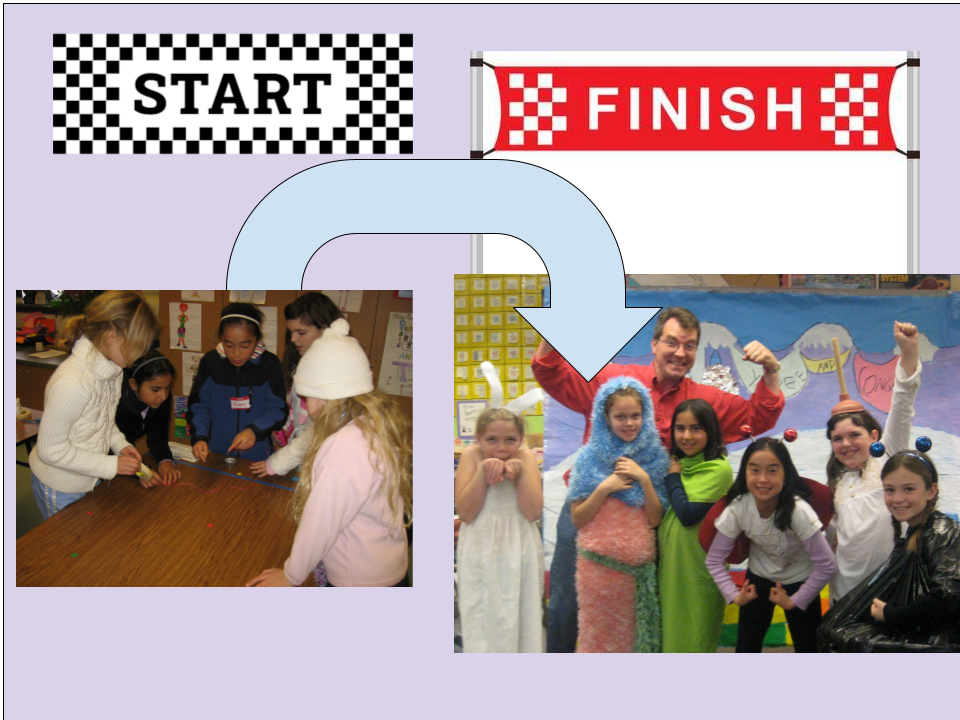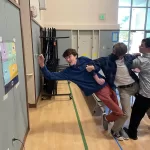Welcome to our Team Tip Series!
These tips are curated by Team Director Bob Lipman, who has been pivotal in keeping our NorCal Odyssey of the Mind Association going and growing in a myriad of ways—coach, coordinator, director, photographer, and videographer, among other roles. If there was ever someone to ask for a tip, it’s Bob. So, let’s get into it!
The time before your team really starts solving the problem is a GREAT time for Spontaneous problems and getting to know the team members’ strengths. You should also plan to get to know the parents/guardians of the team members and seek out their support. You may want to choose NOT to talk about ideas for the long-term problem(s) until you are certain all members are committed to the team. You can replace team members who haven’t added to the team’s solution. But once they’ve added ideas, they count as one of the team minds working on the solution. And you can only have a total of 7 minds solving the problem.
Start and End with Something Fun: If your team is just meeting each other for the first time, try a couple of Team Building Activities that help them learn names (Name Whomp ‘Em or Name Juggle-See Bob’s Top 10 Team Building Activities). Spontaneous problems can also be used as team building and fun activities.
Set Ground Rules and Format for Each Meeting: Start by asking what are the basic rules of their school and/or classroom. A rule about No Put-Downs or Negative Comments should be included. I call it the Thumper Rule: If you can’t say anything nice, don’t say anything at all. Be sure to break the meeting up into sections with new areas of focus
- Spont problem
- Team building activity
- Learning OM rules or specifics of the long-term (LT) problem
- Learning/practicing a skill (in performing, construction, etc.)
- Snack/Stretch Breaks
Snack Time and Schedule: Decide when snack time will be. Some teams like to start with snacks, team member check-ins, and get-to-know-you questions. Some teams like to have snacks in the middle as a break time. Some teams like to have snacks at the end as a reward and time to give compliments. Each team member should take turns providing snacks for the team. An easy way to remember whose turn is next is in alphabetical order by first name. The coach should get into the practice of sending a text message out 1-2 days before practice reminding the team of practice and who has snacks.
End with a Round of Compliments & Reminders: By having team members join in the process of giving compliments, they look for good things that have happened during the meeting and it can perhaps motivate some of them to be productive and work hard(er).
Remind the team of Outside Assistance rules if they are to work on something at home and who is responsible for bringing snacks to the next meeting.
Getting to Know the Team Members’ Strengths: Besides using a hands-on Spont problem to see who the leaders, builders, thinkers, and organizers are, you can ask the team direct questions about what they like to do in and outside of school.
- What subject(s) do you like in school?
- What do you like to do in your free time (that might be used with OM)?
- What types of books, movies, TV shows do you like?
Some of their answers might help decide roles and directions as the team solves the problem.
Parent Meeting Have the parents/guardians join you at the end of the first meeting to discuss the Student-Parent Agreement (if you want to use them) and Parent/Guardian Guidelines of what they CAN and CANNOT do when supporting their child and the team. That document also talks about helping the team at the tournament by being a Judge or a Volunteer.
Parents can help you find a Judge or Official if they are not willing to perform the task themselves by asking their child’s teacher, their neighbors, other family members, coworkers, etc.
Volunteering as a Tournament Judge or Official has more specifics about this important task. Start the process early of finding someone to represent the team at the tournament as the team’s judge.
Getting to Know the Team Parents’ Strengths: You can ask during the meeting or through a follow-up email, what strengths/talents/tools the parents/guardians have (that might be useful skills in OM)
- electrical work
- programming
- how to work with hot glue
- how to cut wood on a table saw
- how to use various tools
- how to sew, use a sewing machine
- different ways to style hair or apply make-up
- different theatrical skills/techniques
They would be invited to teach the team that tool or skill IF the team asks. How Other Parents Can Help provides additional ways parents/guardians can help.
Beyond the First Meeting(s) The best document available to coaches and teams is NorCal’s Odyssey in 10 Weeks Program with Spont Problems and Resources for each week along your journey. Good luck! And remember to HAVE FUN!






